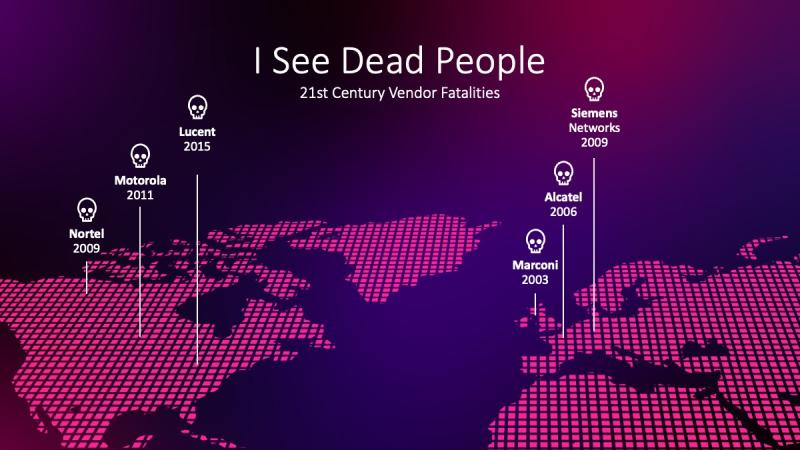-
Surviving the cloud apocalypse requires communications suppliers to adopt both new technologies, and new ways of deploying them
-
In this fast-moving, explosively innovative environment, no company can be considered a sure bet
-
Reminder: there have been half a dozen major vendor fatalities already this century
Last week’s news that Nokia had lost out to Ericsson on a $14 billion AT&T Open RAN contract sent the comms industry into a tizzy, with speculation that this could herald the end of Nokia as we know it – forcing the company to be broken up and sold in chunks.
This, in turn, elicited a bout of pearl-clutching from Nokia advocates, appalled by the idea that the 158-year-old company - a stalwart of the telecom industry — might not make it.
I don’t know if Nokia will be broken up (I hope not – I have good friends at that business, and break ups are hard for everyone involved, aren’t they?).
But one thing I do know, and I’ve been saying it all year, is that a bunch of major companies aren’t going to survive the current transition to a new cloud world.
One of John Chambers’ best-known aphorisms is that companies fail because they miss a big transition. And our industry is currently going through several at the same time… AI, cloud, automation, and the defenestration of Olde Worlde 19th Century service provider business models, to namecheck four.
In this kind of fast-moving, explosively innovative environment, no company can be considered a sure bet.
And yet, during my travels around the world in 2023 with Silverlinings, I met with senior executives at several major telecom vendors and service providers who seemed completely unaware that this is ‘survival of the species’ time.
The conversations tended to go like this:
Steve: “Are you worried about surviving the transition to cloud and related next-gen technologies?”
Vendor: “Hahahaha, nooooo! No… No…. [beat] … Wait, what?”
Which is odd, given that there have been half a dozen major vendor fatalities already this century. These are seismic events for the communications industry, and we are overdue for a big one. (See chart below.)

The tech industry’s “Go Bag”
Surviving the cloud apocalypse requires communications suppliers to adopt both new technologies, and new ways of deploying them.
The days of selling point products (need network control? Buy my router! More speed? Have an optical switch!) are numbered. The money now lies in combining multiple next-gen technologies into holistic solutions that make and save money in both private and public networks (Note: I’ll be writing more about this in a column to be published next week; there’s lots to say).
Nokia and its Sveedish rival Ericsson both understand the need to tackle this new challenge; it’s what most of their marketing efforts focused on at this year’s MWC show in Barcelona.
But moving to a new business model takes time, and the money arrives later (years later). In the meantime, both companies are having to contend with another potential nemesis: Huawei.
The Chinese mega vendor has grown its global share of the telecom market from 4% to 32% over the last two decades, according to Dell’Oro Group. And it is miles ahead of the rest of the world in deploying AI-enabled, cloud-native 5G infrastructure in vertical industries - something I saw first-hand this year, here, here and here.
No Rules, Just Right
Obviously, Huawei isn’t a factor in the AT&T deal (it’s banned in the U.S., for anti-competitive reasons), so what the heck happened there?
AT&T’s CEO John Stankey has been wishy-washy on the rationale, leaving the industry to fill in the blanks with the rumor that Nokia didn’t invest sufficient energy in developing a cosier customer relationship at AT&T. This tracks with the reputation of Nokia’s Finnish executives for being, um, aloof (high IQ, low EQ).
Is it conceivable that Nokia lost out because CEO Pekka Lundmark didn’t spring for an extra Bloomin’ Onion at Outback Steakhouse? If so, then its guilty of breaking one of the most fundamental rules in trade sales: the customer doesn’t care how much you know until they know how much you care.
This is Nokia’s second chess game with the Grim Reaper, after making a proper bollocks of its mobile phone business in 2010. I certainly hope it doesn’t get broken up. Competition, not consolidation, or government politicking, is what we need in the global communications industry right now.
Survival will depend on Nokia’s ability to execute across multiple technologies in multiple industries, while nurturing trusted supplier relationships with customers, new and old. It might also try returning multiple emails from Silverlinings requesting a briefing on its 2024 cloud strategy.
